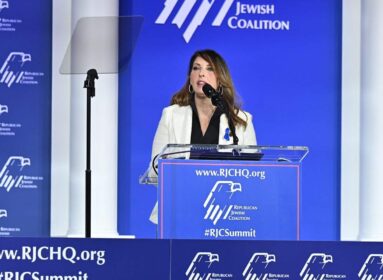Young Ugandan Jewish leader says times are changing for women in her community
By Cindy Mindell
Judaism came to Uganda in 1919, when Mugandan military leader Semei Kakungulu came to believe that the customs and laws described in the Torah were true. Rejected for his beliefs by his community, he settled in Gangama in eastern Uganda, and founded a sect called Kibina Kya Bayudaya Absesiga Katonda, the Community of Jews who trust in the Lord.
“Abayudaya” is Luganda for “People of Judah.” There are some 1,500 members of the Abayudaya living in seven villages near the town of Mbale in eastern Uganda, each community with its own synagogue and several with Jewish schools and other institutions.
Now, Shoshannah Nambi, 25, of Uganda, a young Jewish leader and activist in the Abayudaya community, will visit the U.S. to talk about life in her community. Her trip is sponsored by Kulanu, a non-profit organization that supports isolated and emerging Jewish communities around the world. Nambi will visit Congregation B’nai Israel in Trumbull on Sunday, Oct. 27.
Nambi’s research in Abayudaya villages showed that most women are aware of the unique challenges they face in a traditionally male-oriented society. She will talk about how the community is meeting these challenges and encouraging women to seek leadership roles in their villages and in the greater Abayudaya community.
“There were approaches made by the Abayudaya 20 years ago to mainstream Jewish organizations, who weren’t interested,” says Judith Manelis, co-vice president of Kulanu’s board. “Today, American rabbis are recognizing the importance of what’s happening in the world. There is some suspicion about Jews in Africa: why do they want to be Jewish? But they’re not looking to leave; they want to stay in their communities and practice Judaism. They don’t understand how we American Jews, with our freedom and resources, aren’t in synagogue every Shabbat.”
Kulanu has been working side-by-side with the leaders of the Abayudaya Jewish community for 16 years. In 2005, Kulanu helped the main Abayudaya village receive electricity when it joined Uganda’s national electricity grid. In 2007, it helped the community drill its first water well at their school.
Recently, Nambi spoke with the Ledger about modern Jewish life in East Africa.
Q: Tell us a bit about your life.
A: I went to Semei Kakungulu High School in Nabagoya Hill, a Jewish village. Kulanu is funding the school [opened in 1999]. At Kampala International University, I studied business administration specializing in banking and finance, on funding raised by Rabbi Jeff Summit at Tufts University Hillel. I am looking for a job now. I worked as an administrator in a community clinic from 2011, after I graduated, until early this year. Right now, I am volunteering with RAIN Uganda, Responding to HIV/AIDS and Intervening for the Needy, founded by a doctor in our community who also went to university on the Tufts Hillel funds. We provide HIV testing, education, and counseling, as well as screening for cervical and breast cancer. I am on the management team, an HIV counselor, and the accountant.
I have a daughter, Emunah, who is almost five and goes to the Hadassah Primary School, funded by Kulanu.
Q: What is your Jewish background?
A: I was raised Jewish. My great-grandfather became Jewish while he was a soldier working for Semei Kakungulu. I went to St. Joseph Catholic primary school, which had a church. There were very many other schools, but this one was near us, and we only had to walk two miles to get there. It was hard to be Jewish at the school. The teachers and big people had no problem, though they wanted us all to go to the church every day. But the kids did not understand anything about being Jewish. You couldn’t say you were Jewish, because they said that we killed Jesus. Most of the people from my community went there. One day I said to my best friend, ‘I see you at our synagogue,’ and she said no because she was with her friends and didn’t want them to say that she killed Jesus.
My mother was Jewish. When she was 14 or 15, there was no money for school and she was doing nothing, so she went to Kenya to find work, with friends who had parents there. She got married – my father was not Jewish – and I and my two brothers, David and Abraham, were born in Kenya. She brought us back to Uganda when we were young, to our grandparents, and they raised us Jewish.
I did a bat mitzvah at age 18 because I read that girls do bat mitzvah. Before, I didn’t know that girls could do it. I remember that a girl did it when I was young, but my grandparents did not go to school, did not read, and didn’t think it was a big deal for me to do. We were three girls and one boy on the same date, and read Parshat Bo. We had practice with a teacher, one of the very active women in the community, who told us how to lead services and read from Torah, and we had a meal for the celebration. My brothers also did a bar mitzvah at age 18.
At university, people did not know much about Judaism. Someone asked me, “Which religion are you?” and when I said, “Jewish,” she said, “I mean, which Christian religion are you?”
Our rabbi, Gershom Sizomu, comes from the same community and village but went to American Jewish University for five years to be a rabbi and was in Israel for one year. We used to call him “rabbi” before because he was a teacher, and he read a lot of books and explained them. We had so many people called rabbis but he is the first “official” one.
In our community, we have 100 Hebrew names to choose from. My parents gave me the name Susan and I picked Shoshannah. Most parents today give their kids Hebrew names from the Bible.
Q: Why did you decide to visit the U.S. and what is your message?
A: Kulanu brings one person every year from a community they help, and they have been bringing people from my community. This is the first time they have brought a woman. I want to report on the women’s situation in my community.
The community is changing a lot, very fast. Women now can have businesses, and go to school and get degrees. It didn’t used to happen: their work was to wait and get a husband and be in the kitchen and stay home. Now they lead services, have bat mitzvahs, read from the Torah. I will talk about the differences between the generations of women in my community, including a very interesting old woman. You see that the first generation didn’t have education at all and had 14 kids, but they were still resistant that women could do something more in the synagogue. The second generation had seven kids and had more education, and now a lot of women only have two kids and go to university.
Most of the men in our community accept these changes. We have a wonderful rabbi; he advocates for women to take equal roles in everything, in synagogue and schools. He talks to men and women together: “Women can also do this; men can also do this, maybe help with housework.” Some men still believe that women should be in the kitchen and at home but most are supportive – if you see a woman with a business, it’s because the husband was supportive.
Most of the Jewish community are educated and read from the Torah. Going through primary school, high school, and university education, people who have learned go back and tell their parents that certain beliefs are not true. For example, in the 1930s and 1940s, women were not allowed to eat chicken or fish or eggs because men told them it would make them barren. The daughters of the Jewish leader, Samson Mugombe Israeli, ate these to prove that it wasn’t true, and his daughters had very many children. With more people going to school, you cannot tell us something like that now.
Sunday, Oct. 27, 4 p.m., Congregation B’nai Torah, 5700 Main St., Trumbull | RSVP/info: (203) 268-6940 / office@bnaitorahct.org
Kulanu (“All of Us” in Hebrew), founded in 1994, supports isolated and emerging Jewish communities around the world, many of whom have long been disconnected from the worldwide Jewish community. Kulanu raises awareness and support for these communities through education, research, and publications about their histories and traditions. Kulanu communities are found in Africa, Asia, Europe, and North and South America.
For more information about Kulanu and the Abayudaya, visit www.kulanu.org/abayudaya.
Comments? Email cindym@jewishledger.com.







 Southern New England Jewish Ledger
Southern New England Jewish Ledger














